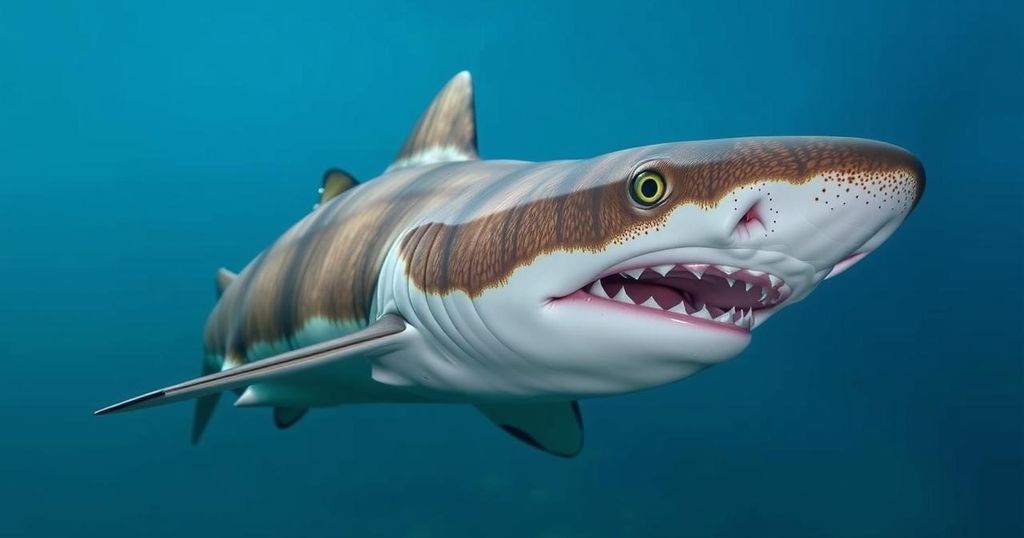Science
” GONZALEZ, ATLANTIC, BRAZIL, CENTER FOR SHARK RESEARCH, CHAPMAN, CINDY GONZALEZ, DEMI, DEMIAN CHAPMAN, FAMILY FOUNDATION, FIU, FOSSIL DISCOVERY, FOSSILS, LATIN AMERICA, MARINE BIOLOGY, MICROSOFT, MOTE MARINE LABORATORY, NORTH AMERICA, PANAMA, RESEARCH, SCIENCE, SOUTH AMERICA, SUSTAINABILITY
Rajesh Choudhury
0 Comments
New Hammerhead Shark Species Named After Microsoft Co-Founder Paul Allen
Florida International University researchers have identified a new hammerhead shark species, Sphyrna alleni, named after the late Paul G. Allen, co-founder of Microsoft. The species, which resembles the bonnethead shark, was discovered through DNA analysis and collaboration with local fishers in Belize. This finding underscores the urgent need for shark conservation as the new species faces threats from overfishing and habitat destruction.
In a remarkable scientific achievement, Florida International University (FIU) researchers have unveiled a new species of hammerhead shark, designated as Sphyrna alleni, in honor of the late Paul G. Allen, the Microsoft co-founder known for his philanthropic contributions, particularly in shark conservation. The discovery reveals that this species, previously mistaken for the bonnethead shark (Sphyrna tiburo), is distinct, thanks to DNA analysis and physical characteristics that set it apart.
The research, driven by scientists including lead author Cindy Gonzalez and former associate professor Demian Chapman, was supported by Allen’s foundation, which emphasizes a commitment to protecting marine life. Chapman noted that while genetic studies hinted at multiple species within the bonnethead category, extensive physical examination was vital for accurate classification. Gonzalez’s investigations in Panama echoed these findings, laying the groundwork for the identification of this new shark species.
This shovellbill shark, primarily found from Belize to Brazil, has gained its name from local communities familiar with its presence. Gonzalez describes the collaborative effort with local fishers, who contributed invaluable knowledge and participated in specimen collection, emphasizing the importance of community involvement in conservation science. However, their work faced disruption from the COVID-19 pandemic, leading Gonzalez to adapt her apartment into a makeshift lab, showcasing her dedication to completing the project.
As Gonzalez highlights, conserving these small hammerhead sharks is crucial, as they significantly influence local economies and cultures, particularly in Latin America. The newfound species faces existential threats, exacerbated by overfishing and harmful fishing practices. With Allen’s legacy in mind, Chapman continues to drive forward the Global FinPrint project, which aims to assess the condition of reef sharks worldwide and guide conservation strategies based on emerging insights.
Strikingly, the realization of the shovellbill shark’s status as a distinct species urges immediate action to avert its extinction. Belize’s proactive measures, including the establishment of protected zones and collaboration with fishing communities, serve as a beacon of hope amid the challenges facing marine ecosystems. In this race against time, the dedication of researchers and fishers alike is vital for safeguarding these unique sharks and, by extension, the fragile ocean ecosystems they inhabit.
The identification of a new hammerhead shark species by FIU scientists underscores the importance of understanding marine biodiversity, particularly within vulnerable populations. Hammerhead sharks are critical to ocean ecosystems but have been significantly impacted by human activities, including overfishing and habitat degradation. Paul G. Allen’s philanthropic work, notably through his foundation, has played a crucial role in advancing shark conservation efforts. The research tackles issues like species misidentification, which can impede effective conservation strategies.
The discovery of the shovellbill shark highlights the intricate connections between local communities, conservation efforts, and scientific research. As this unique species faces the threat of extinction, the collaborative work between scientists and local fishers stands as a testament to the power of partnership in marine conservation. The urgency to protect these sharks is compounded by their ecological significance and the legacy of advocates like Paul G. Allen, which continues to inspire present and future conservation initiatives.
Original Source: news.fiu.edu




Post Comment